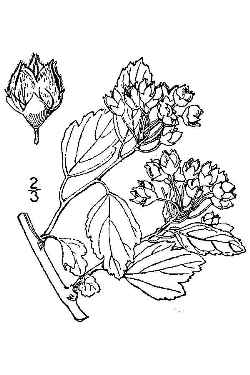Atlantic Ninebark
Scientific Name: Physocarpus opulifolius var. intermedius (Rydb.) B.L. Robins.
Synonym: Opulaster intermedius, Physocarpus intermedius
Family: Rosaceae

Opulaster intermedius, Britton, N.L., and A. Brown. 1913. Illustrated flora of the northern states and Canada. Vol. 2: 244.
Sunset®: 1-3,10
USDA: 2-8
Sun Exposure: Full sun to partial shade
Origin: Eastern North America from Quebec south to Tennessee
Growth Habits: Deciduous shrub, 4 to 5 feet tall and wide (1.2-1.5 m); palmate, 3 to 5-lobed leaves, 1 to 3 inches long (2.5-7.5 cm)
Watering Needs: Low to moderate water
Propagation: Cuttings
The variety intermedius is smaller than the species. The species can reach 10 feet tall and wide (3 m). Common cultivars are:
'Nanus' is even shorter than intermedius.
'Dart's Gold' and 'Luteus' have yellow foliage, up to 5 feet tall (1.5 m).
'Nugget' has also yellow foliage, denser than 'Dart's Gold', and can reach 6 feet tall (1.8 m).
'Monlo' has red new foliage.
Blooming Habits:
Whitish-pink flowers, up to 0.5 inch in diameter (1.2 cm), in 1 to 2 inches wide clusters (2.5-5 cm), in June
Fruiting Habits:
Reddish fruit that ripens in September to October
Desert-Tropicals is dedicated to provide gardening advice, gardening ideas, and information about flower of all kind for landscape and collections.We try to check carefully the identification of the plants on the illustrations as well as the other information from the page, but occasionally errors do occur. if you notice anything that needs to be changed please contact us.Thanks.
© 1998-2020 Philippe Faucon, All Rights Reserved.